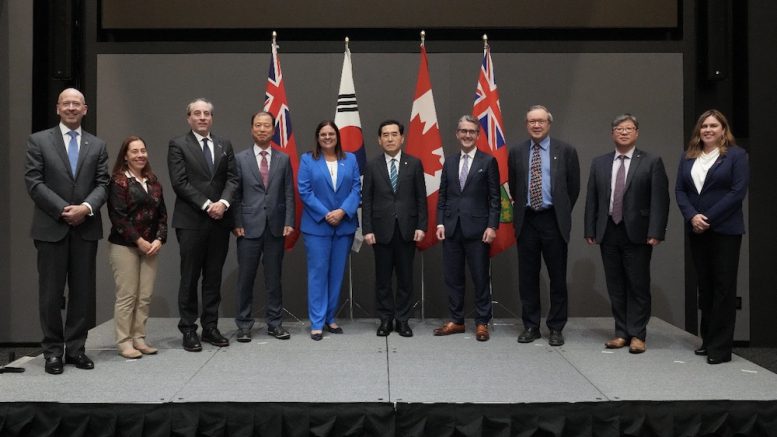LG Energy Solution of South Korea has signed agreements with three Canadian suppliers of minerals used in electric vehicle batteries as it bets on North America to become a fast-growing market for zero-emission autos.
Toronto-based Avalon Advanced Materials (TSX: AVL) and Snow Lake Lithium (NASDAQ: LITM) of Winnipeg will join Electra Battery Materials (NASDAQ: ELBM; TSXV: ELBM), in supplying materials to the global battery maker. The deals with Avalon and Snow Lake, which both have advanced exploration stage projects, are non-binding.
Avalon is to ship battery-grade lithium hydroxide to LG starting in 2025 from a plant it is developing at Thunder Bay on Lake Superior in northern Ontario, the companies said. The commitment is for half of the plant’s production for at least five years.
Snow Lake Lithium has agreed to supply LG with lithium hydroxide over 10 years after production starts in 2025, the miner said. Based on the current resource, Snow Lake says its Thompson Brothers project could produce 160,000 tonnes of 6% lithium spodumene a year over a decade, enough to power 5 million electric vehicles.
The company has not yet completed an economic study on the project, which hosts an indicated resource of 9 million tonnes grading 1% Li2O for 91,200 tonnes, and an inferred resource of 2 million grading 0.98% Li2O for 19,300 Li2O tonnes. Snow Lake says it has only explored about 1% of its 222.6-sq.-km site and is “confident that further exploration will increase estimates over the course of the next year.” Engineering and drilling studies are underway as well as a scoping study to identify the technologies and skills it will need, it said.
Electra is to supply LG with 7,000 tonnes of battery-grade cobalt sulphate from 2023 to 2025 in a deal that could be valued at about US$63 million, considering cobalt sulphate traded this month at about US$9,000 per tonne, according to the Platts Index.
“These partnerships serve as a crucial step towards securing a stable key raw material supply chain in the region,” LG chief executive officer Youngsoo Kwon said in news releases on the three agreements.
“LGES will continue to ensure the steady delivery of our top-quality products, thereby further advancing the global transition to EVs and ultimately to a sustainable future.”
While Kwon claims North America is the fastest growing EV market, statistics from the International Energy Agency show China registered the most EVs last year by far and The Economist notes Europe is the fastest transitioning region. Norway in particular, where nearly 90% of cars sold in 2021 were electric, is a leader.
Nonetheless, the United States alone has some 290 million mostly fossil fuel-powered vehicles that will need to be replaced with EVs over the coming decades as environmental regulations bite and charging stations spread. Bloomberg New Energy Finance forecasts a US$53-trillion global market for EVs between today and 2050.
Demand for critical minerals such as cobalt, lithium and rare earth elements from the burgeoning electric vehicle industry and zero emission power like solar is helping drive mining and refining ore projects. The Ontario government released a critical minerals strategy this year to link the province’s northern mining output with its southern manufacturing industries.
Avalon said it has four projects in advanced stages in lithium, tin, indium and rare earth elements tantalum, cesium and zirconium. It is developing its Separation Rapids lithium project near Kenora in northwestern Ontario and the Lilypad cesium-tantalum-lithium project near Fort Hope, Ont., about 500 km north of Thunder Bay.
“We are delighted to enter into this agreement with LGES to support our aspirations of establishing the mid-stream processing capacity in Thunder Bay to take advantage of the many lithium resources that occur in northwestern Ontario,” Avalon president Don Bubar said in a news release. “This creates a win-win for Ontario’s economy in both the south and the north.”


Be the first to comment on "Korea’s LG taps three Canadian EV battery mineral suppliers"